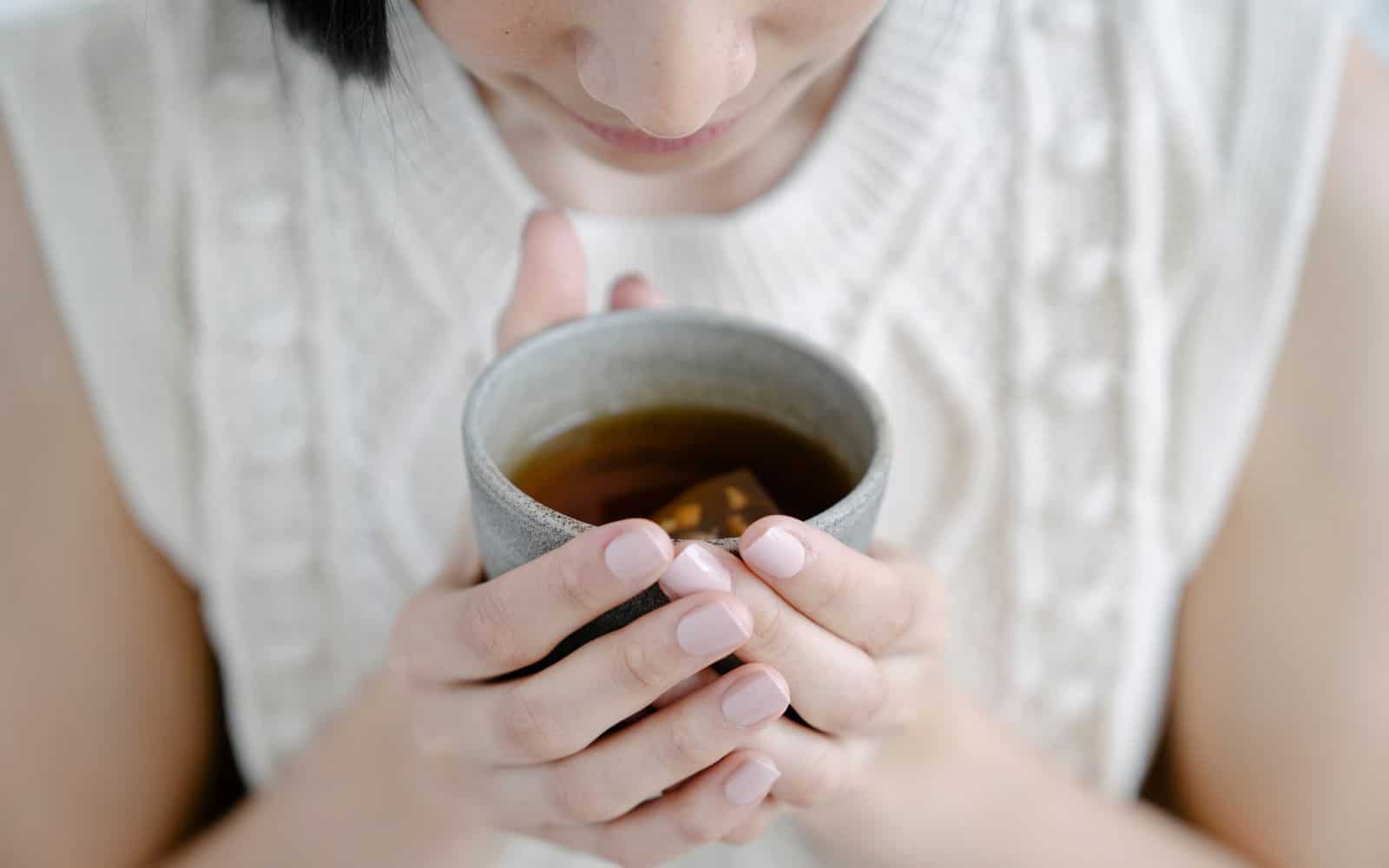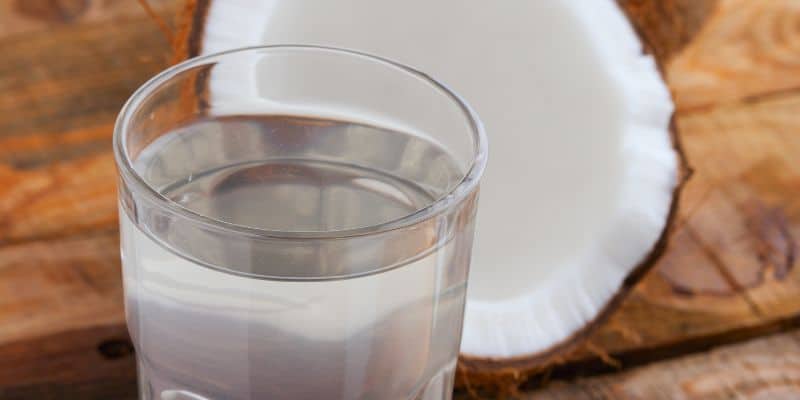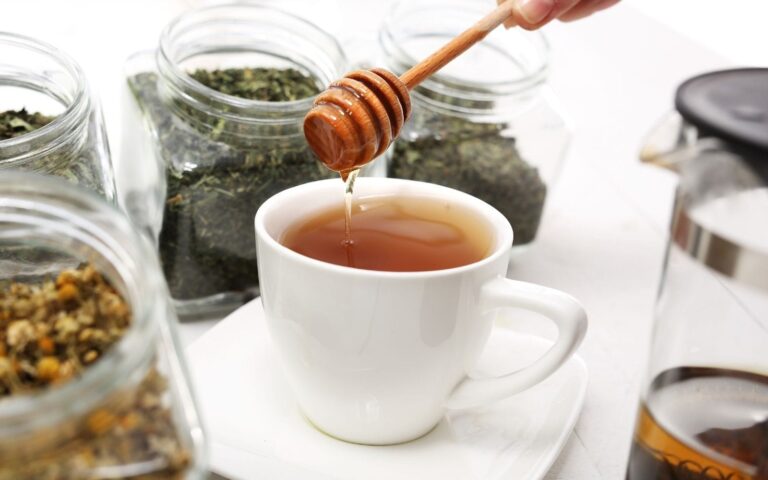Is Herbal Tea Hydrating Or Dehydrating?

Disclosure: This post may contain affiliate links. If you click on a link we may make a small commission at no extra cost to you. You can read the full disclosure here
Is Herbal Tea Hydrating
Herbal teas or rather tisanes are a type of infusion that is made from herbs, spices, dried fruits, and other plant materials. They are typically caffeine-free and often have a variety of health benefits, with many having been used as natural remedies for centuries. These flavorsome infusions can be enjoyed hot or cold and can be a great addition to any healthy eating plan.
Can You Count Tea As Water Intake
Tea is mostly water. When you brew a cup of tea, about 98% of the weight of the resulting drink is water. That means that tea can definitely contribute to your daily water intake.
Herbal tea has long been touted for its hydrating properties, but does it really help to keep your fluid levels in balance? Let’s take a look at the science behind it and see if in fact, the answer to the question “is herbal tea hydrating” one that actually lives up to the hype.
Why Is Adequate Hydration Important

First, it’s important to understand what dehydration is and how it occurs. Dehydration occurs when the body does not have enough water to carry out its normal functions. When we are dehydrated, our bodies cannot sweat properly, which can lead to overheating and possibly heat stroke. Dehydration can also cause dizziness, headache, and fatigue. In severe cases, it can lead to organ failure and death.
To prevent dehydration, it is important to drink plenty of fluids throughout the day and especially during hot weather or when participating in physical activity. It is also important to eat foods that contain water, such as fruits and vegetables. If you think you may be dehydrated, seek medical attention immediately. Early diagnosis and treatment are crucial to preventing serious health complications.
Adequate hydration is important for many reasons. Proper hydration helps to regulate body temperature, maintain healthy blood pressure, ensure that all of the body’s systems are working properly, and helps to prevent fatigue. Additionally, staying hydrated can help to lubricate joints and improve cognitive function and memory.
So, how much water should we be drinking each day? The answer varies depending on a number of factors, including our age, activity level, and the climate we live in. The average person needs around eight glasses of water per day, but more active people may need even more. And if you live in a hot or dry climate, you’ll need to drink even more water to stay hydrated.
Different Teas Produce Different Hydrating Effects.
When it comes to hydration, people often think of water as the only option. However, tea is another great choice for staying hydrated. Tea contains water, of course, but it also has electrolytes and other nutrients that help keep the body hydrated and functioning properly. However, some teas contain caffeine which is a natural stimulant and may affect hydration levels in some people.
Caffeine has been shown to have a diuretic effect, meaning that it increases urine output. The extent of the diuretic effect of caffeine varies from person to person but appears to be modest on average and is unlikely to dehydrate you. For people who are regular, high-level caffeine consumers, the diuretic effect of caffeine may become more pronounced over time.
When caffeine is consumed, it is rapidly absorbed and crosses the blood-brain barrier to stimulate the central nervous system. The kidneys quickly clear caffeine from the blood, and it is eliminated in the urine.
Different teas can have varying effects on hydration depending on the type of tea and how much you consume.
Caffeinated Teas
Teas that are classified as “true teas” are those that are made from the Camellia sinensis plant. This plant contains caffeine, which is why true teas are caffeinated. The amount of caffeine in a cup of tea depends on a number of factors, including the type of tea, the growing conditions, how it is brewed, and how much tea is used.
There are many different types of caffeinated tea, including black, green, white, oolong tea, and pu-erh. Each type of tea differs in its processing and oxidation levels and therefore has its own unique flavor and aroma.
Tea is often lower in caffeine than other caffeinated beverages such as coffee. However, the type and amount of tea you consume can have an impact on your hydration levels. Therefore, if you are looking to improve your hydration levels, it is important to choose a tea that will not have a negative impact on your body’s fluid balance.
Herbal Teas
Herbal infusions are brewed from the leaves, flowers, seeds, or roots of plants, therefore they do not usually contain caffeine. They are rich in antioxidants, which can help protect cells from damage and may boost the immune system. Herbal teas have many unique benefits, including helping to maintain hydration levels, which is why they can be a great choice.
It’s worth noting here that there are some herbs that are naturally diuretic and can therefore promote urine production and excretion. Herbs such as ginger, dandelion, and parsley have all been shown to increase urine output in those who consume them. This effect is likely due to the fact that these herbs contain compounds that act on the kidneys to increase urine production.
Other Hydrating Beverages

As refreshing as a glass of water can be, there are times when it just becomes a little boring and predictable. As we have established other beverages like tea and herbal infusions can contribute to a person’s daily fluid intake, despite their caffeine content, without leading to dehydration, especially when consumed in moderation.
What’s more, herbal teas are available in a wide variety of flavors with exciting and often exotic aromas making them a flavourful alternative to be enjoyed alongside water. More importantly, these infusions are often packed with antioxidants and vitamins offering health-promoting effects – so what’s not to love?
However, if you are still looking for an alternative hydrating beverage to either water, true tea, or herbal infusions then let’s check out some options.
🥤Coconut Water
When it comes to hydration, coconut water is often lauded as a natural alternative to sports drinks. It is an excellent source of hydration, due to its high levels of electrolytes and minerals. When consumed, coconut water can help to replenish fluids and electrolytes lost during exercise or in hot weather.
Additionally, coconut water contains a high concentration of potassium, which is essential for proper nerve and muscle function. Coconut water is also low in calories and fat, making it a healthy option for those looking to maintain their weight.
🥤Watermelon Juice
Watermelon juice is another delicious source of hydration, containing high levels of both water and electrolytes. The combination of these two components makes it an ideal beverage for rehydrating the body, particularly after exercise. Watermelon juice is also a good source of vitamins and minerals, including potassium, which is essential for maintaining fluid balance in the body. Additionally, the antioxidants present in watermelon juice can help to protect against cell damage and reduce inflammation.
🥤Fruit Infused Water
If you’re looking for a thirst-quenching drink that is low in calories and has some possible additional health benefits to just drinking plain water, fruit-infused water might be the perfect option for you.
This type of water not only tastes great, but it can help to improve your overall health by providing hydration and nutrients such as vitamin C. Infusing your water with tasty flavors can encourage you to drink more water each day. Fruit-infused water is great for children and adults alike. It’s a great way to get your kids to drink more water and it can be a tasty alternative to sugary sodas, fruit juices, and high-calorie sports drinks.
🥤Milk
Milk is another good choice of beverage because it’s high in protein and electrolytes. These nutrients are essential for rehydrating the body and restoring fluid balance. Drinking milk on a regular basis can be beneficial for overall health because it provides calcium and other nutrients that are essential for strong bones and teeth. It can also keep you feeling fuller for longer.
🥤Green Smoothies
Green smoothies are an excellent way to improve hydration. The high water content of the fruits and vegetables in the smoothie helps to keep the body hydrated, and the nutrients in the smoothie help to replenish electrolytes. Green smoothies can be low in sugar and are a convenient and delicious way to not only improve your fluid levels, but by using the whole fruit and vegetable, you are also getting plenty of fiber for improving gut health, so drink up!
Conclusion
There’s no doubt that hydration is important for our overall health and well-being. After all, our bodies are made up mostly of water, so it’s crucial that we replenish the fluid we lose throughout the day. But when it comes to staying hydrated, many of us don’t realize just how important it is to drink enough fluid every day.
As we have seen there are a variety of ways to ensure we are getting enough healthy fluids each day and drinking herbal tea is a great option. It offers a wide variety of health benefits and is certainly a tasty way to help you stay well hydrated. So, next time you are feeling thirsty, why not give herbal tea a try?
Can You Count Tea As Water Intake?
Yes, tea can be counted as water intake. When calculating water intake, it is important to consider all sources of water, including tea. Tea contains water and also provides hydration benefits. Therefore, including tea as part of your daily water intake can help you meet your hydration needs.
What Can You Drink If You Don’t Like Plain Water?
If you do not enjoy the taste of water, there are a few options you can choose from. You could try adding some fruit or vegetables to infuse the water with flavor or try a variety of flavored water available on the market. Alternatively, herbal tea may be more palatable for those who don’t enjoy water and they are available in a variety of wonderful flavors.
What Are The Main Symptoms Of Dehydration?
The main symptoms of dehydration include thirst, dry mouth, dark yellow urine, fatigue, dizziness, and lightheadedness. Dehydration occurs when the body loses more fluid than it takes in and can lead to serious health problems.
What Are The Best Heral Teas For Hydration?
Herbal teas are a great way to stay hydrated and there are many different types to choose from. When it comes to hydration, the best herbal tea is one that contains electrolytes and minerals. This can be found in teas such as chamomile, peppermint, or hibiscus tea. These teas will help replenish the body with the fluids and nutrients it needs to function properly.






